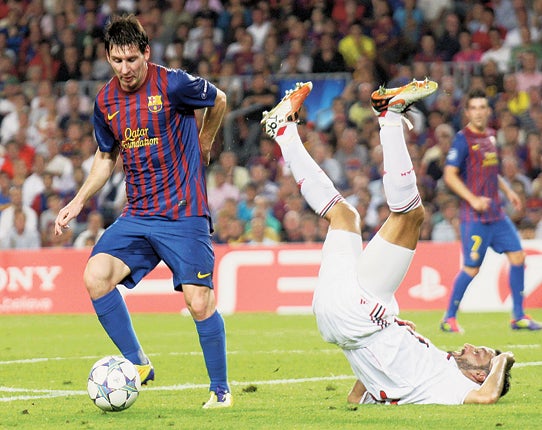Perez presence brings swift end to La Liga's financial revolution

Your support helps us to tell the story
From reproductive rights to climate change to Big Tech, The Independent is on the ground when the story is developing. Whether it's investigating the financials of Elon Musk's pro-Trump PAC or producing our latest documentary, 'The A Word', which shines a light on the American women fighting for reproductive rights, we know how important it is to parse out the facts from the messaging.
At such a critical moment in US history, we need reporters on the ground. Your donation allows us to keep sending journalists to speak to both sides of the story.
The Independent is trusted by Americans across the entire political spectrum. And unlike many other quality news outlets, we choose not to lock Americans out of our reporting and analysis with paywalls. We believe quality journalism should be available to everyone, paid for by those who can afford it.
Your support makes all the difference.The Spanish revolution looks like being still-born after an attempt to introduce greater parity in television income largely evaporated.
Last week José María Del Nido, the president of Seville, rallied a dozen clubs behind an effort to restore competitive balance to La Liga by reducing Barcelona and Real Madrid's currently overwhelming share of TV income. However, according to leaks from a meeting of clubs on Thursday, which, unusually, was attended by Real's powerful president Florentino Perez, Del Nido is now only backed by Espanyol and Real Betis.
Juan Mata was very diplomatic when he was unveiled by Chelsea on Thursday, but he did make one notable criticism. When comparing La Liga and the Premier League he said: "Unfortunately in Spain there is a lack of real competition. From January-February it is clear that there is a big difference in the form of Real Madrid and Barcelona and the rest. Here it is different."
Critics will suggest it is only different to a degree, instead of a two-horse race there are four or five in runners, but the gap between top clubs and the rest is more bridgable at individual matches. From the same 76 games, Barcelona and Real won 188 points last season, the Premeir league's leading two (Manchester United and Chelsea) won 151. Mata's Valencia came third last season, 21 points behind third-placed Real, 19 points ahead of relegated Deportivo La Coruna. This season began with Barcelona beating Villarreal (fourth last season) 5-0 and Madrid defeating Real Zaragoza 6-0.
Spanish clubs negotiate their own television contracts, so the big two make a fortune and the rest get scraps. Real and Barcelona received €135m (£118m) from domestic rights last season, ten clubs received €15m or less. In England, Manchester United received £60.4m, Blackpool, who were the division's lowest earners, £39.1m. One consequence of this is that several clubs had trouble paying players leading to the players' strike that forced the cancellation of the season's opening weekend.
It was against this backdrop that Del Nido described La Liga as "the greatest pile of junk in Europe" and pushed for reform along the lines of the English model. Florentino looks to have outmanouvered him, which is bad news for their English Champions League rivals as well as the likes of Seville.
Join our commenting forum
Join thought-provoking conversations, follow other Independent readers and see their replies
Comments